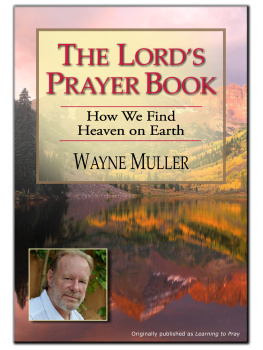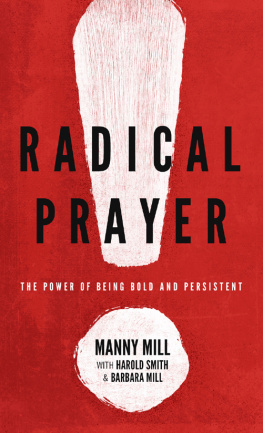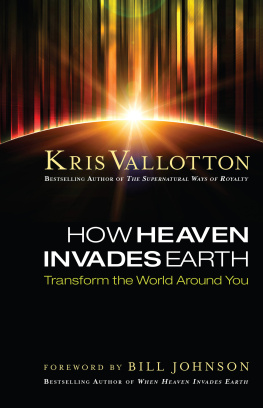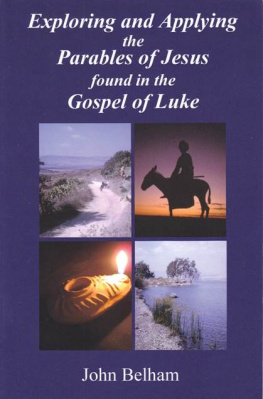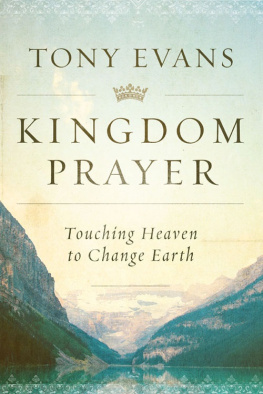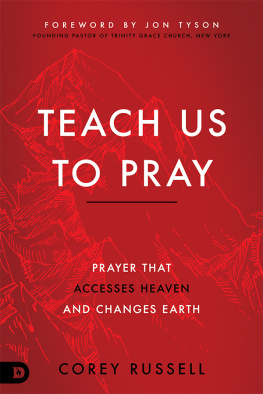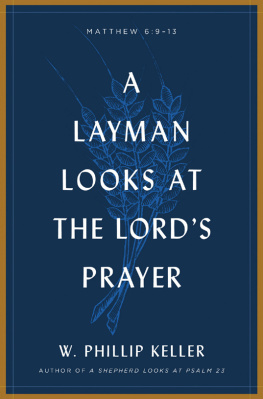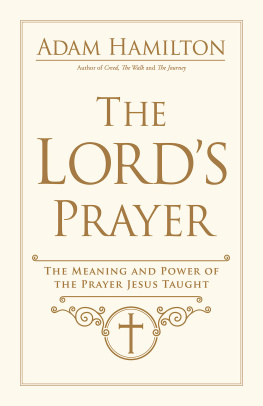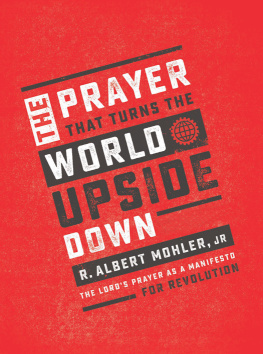OUR
When we pray, we never pray alone.

N owhere in the Lords Prayer do we find the word I. Prayer is not a solitary practice; as prayer guides us inward, we are led into deep communion with everyone who has ever prayed. Beginning with the word Our, we cultivate a deep intention to pray on behalf of, and in the company of, the entire family of creation.
We belong to something larger than ourselves. Even in complete solitude, we remain part of a living community. When we praywhen we retreat to a still place of deep listeningeven in our intimate seclusion, our prayers reverberate through the connective fabric of life.
When we pray, even as we lift up our own deep needs and yearnings, we also pray for grace, joy, and the alleviation of suffering for all beings. Prayer honors deep, unseen connections that place us in kinship with all beings. Throughout this prayer, we hear the echo of our collective yearning our Father, our bread, our trespasses.
Sadly, our society seeks to deny the astonishing power of our deep interconnectedness by promoting a corrosive illusion of isolation and self-sufficiency. As we seemingly become more and more self-sufficient in our cars and on our computers, we are trapped by an insidious lie that we can somehow live apart from the subtle dance of interdependence. This is a terrible misunderstanding that does violence to the spirit, and promotes a feeling of being crushed by the weight of deep loneliness.
In truth, countless others accompany us each step of the way, and we do nothing without their assistance. Have we ever grown all our own food, built our own homes, woven the cloth for our own clothing? Every moment we live, we depend on the labor of countless farmers, teachers, doctors, carpenters, truck drivers, nurses, miners, parents, children, artists, loggers, steel workers, cattle, bees, worms, treesnumberless people and beings. When we proudly proclaim that we are self-sufficient, we deny the nourishment and companionship offered us by the rich family to which we belong.
So when we pray for inner peace and healing, we also seek some benefit for all who are in need. But how can we pray for so many when our own needs seem so immediate? Pulled by too many demands, committed to too many projects, we often feel overwhelmed by the needs of others, and seek in prayer to retreat, to remove ourselves from people, and take refuge in solitude. This is, for many of us, the attraction of prayer.
WHY DO WE PRAY?
I often feel called to pray when I am weary and depleted, when I feel as if the weight of the world were on my shoulders. As much as I resolve to offer my best, to do my work, raise my children, contribute to my community, and be a good friend and useful citizen of the planet, I can feel overwhelmed and discouraged that I have not done more.
But if I look carefully at myself in these moments, I find I have taken on these things as if they were my work alone. Whenever I take on more than I can honorably do, or try to do more than I can honestly handle, something inevitably goes wrong. Then I feel like a failure, disappointed I could not do everything right. In the end, I feel isolated and lonely. It is in times such as these that I find myself needing some solace, seeking comfort and sanctuary in prayer. In isolation, the Buddha cautions, lies the worlds great misery.
I was newly graduated from Harvard Divinity School when I moved to Santa Fe, New Mexico. There, a group of Plains Indians invited me to take part in a sweat-lodge ceremony Although I had spent three years studying the worlds religions, I had never participated in such a ceremony, and I was more than a little nervous. The temperatures in a sweat lodge can get very high, and I was afraid I wouldnt be able to stand the heat. What if I needed to leave? My hosts were gentle and understanding, and assured me that I could leave when I wished.
They took all day to prepare the fire and arrange the lodge in the manner prescribed by tradition. Willow branches were cut, shaped, and tied to frame the lodge; blankets covered the frame; a fire pit was dug and large rocks were gathered to be placed in the raging fire for several hours. When the time came to begin the ceremony, we all gathered around the lodge. It was winter, it was night, and it was snowing.
The one who tended the fire told me that as I entered the lodge, I must say aloud the words mitakuye oy-asin to all my relations. When Native Americans say all my relations, they do not mean only grandparents, aunts, uncles, and cousins, although they do include these blood relatives. They also mean to encompass all our relations in the family of creation, the two-legged, the four-legged, the birds and fish and plants and even the trees who gave their lives to make this fire that heats these rocks that make the steam in the sweat lodge.
During this ceremony I learned that all my relations was a rich and magnificent acknowledgment of the interconnectedness of all life. We each took turns to speak as we went around the circle, four times in all, offering prayers in each of the four rounds to the four directions, for the earth, for those in need, for the animals on this land, for Father Sky and Mother Earth and all her creatures. In the intimate circle of the lodge, smoking the pipe of peace as a blessing for each prayer, I felt the palpable sacredness of that interconnection in ways I had never felt before. I also felt a creeping humility overcome any sense I may have had that my divinity degree was the culmination of my spiritual training. Clearly another spiritual adventure was just beginning.
Many indigenous peoples, when they begin prayer or worship, invoke the presence of their ancestors, honoring all those who have come before, confessing from the start that we cannot possibly do this work of living and loving, building and feeding, growing and healing all by ourselves. We seek the wisdom and nourishing company of all who have gone before, and pray for the healing of all who will come after.
In the same spirit, the traditional Buddhist Metta, a prayer of loving kindness, is offered for the alleviation of suffering of all sentient beings.
May all beings be healed.
May all beings be at peace.
May all beings be free from suffering.
PRAYING FOR OUR FAMILY
When I lead retreats, I begin by asking those present to think of someone dear to them. I ask them to recall a particular person whose loving kindness startled them awake, whose gift inspired them to be strong or faithful, who offered bread when they were hungry, water when they were parched with thirst.
I want to bring my grandfather into the circle, explains a young pediatrician. He was always kind to me, never harsh. Whenever I walk into the room of a child in my care, I remember his gentle manner, and I feel him there with me.
A woman speaks up. I would like to invite my aunt, she says. I had pneumonia when I was a little girl, and I remember my aunt sitting by my bed for hours, just sitting there, singing to me, holding my hand. She could not heal my sickness, but her presence made me feel strong and safe. I would like to feel her by my side again. She is quiet, a tear slowly spills onto her cheek.

